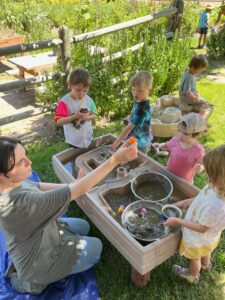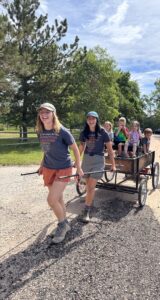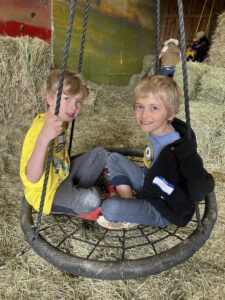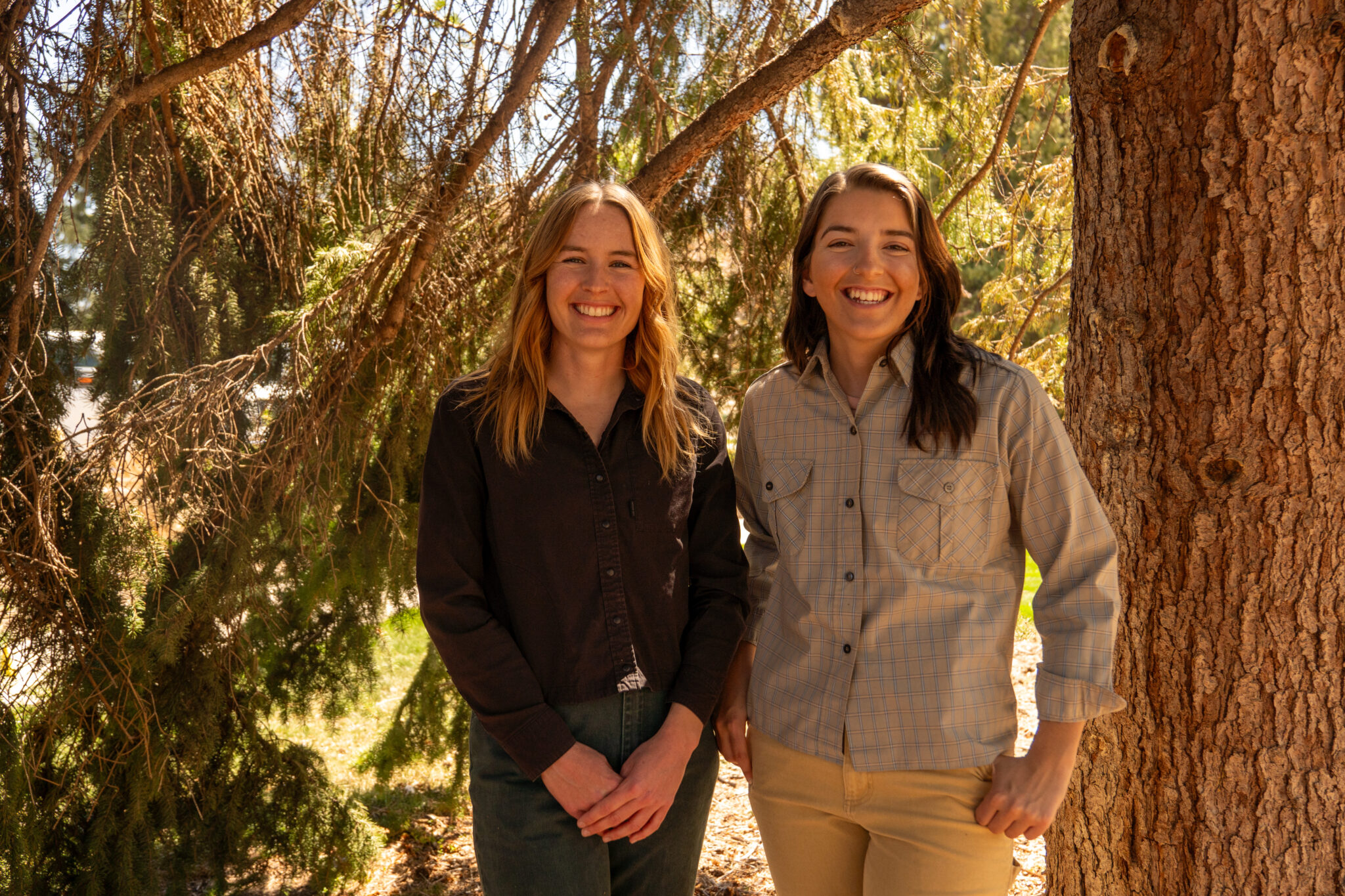In Colorado, who doesn’t enjoy spending time outside? With its diverse landscape, Colorado offers a plethora of outside spaces to relax in. These spaces can be therapeutic and even act as an escape for some people.
Nature-based therapy, not to be confused with wilderness therapy, is the practice of connecting with nature for mental and physical health benefits. Two Colorado State University Department of Occupational Therapy alumni have taken the idea of nature-based therapy one step further and founded their own practice dedicated to helping their patients in outdoor settings.
Exploring new horizons
Emily Tull (’22) and Emily Grieb (’22) met while working towards their master’s degrees. After their joint three-month fieldwork at a nature-based therapy clinic in Washington state, they came back to Fort Collins determined to spread the idea here in Colorado.
“We both had plans to go back to Fort Collins and thought, ‘hey, no one is doing this in Fort Collins,’” said Tull. “While there are tons of really awesome camps that are very inclusive, there are families who are looking for camps that are not just inclusive but are spaces actually cultivated for neurodiverse individuals and children and teens with disabilities.”
Noticing the lack of camps, Tull and Grieb launched Peaks and Bounds. Both Tull and Grieb grew up with a passion for the outdoors and both worked at outdoor camps at some point in their lives. Thus, a career centered around nature was in the cards for both of them.
“My passion for working with kids in nature grew even stronger during our three-month fieldwork in Washington,” said Grieb. “We provided occupational therapy services in the forest and on the beach. Doing sessions outdoors brought out more creativity and sensory exploration, and we could address all the same goals we would in an indoor clinic.”

Inclusive outdoor healing
Peaks and Bounds offers both camps and private nature-based occupational therapy for all ages. Their mission aims to facilitate access to meaningful outdoor activities while empowering individuals with disabilities, diverse neurotypes, and identities, to everyone across the lifespan.
“These sessions can be conducted in outdoor spaces of the clients choosing, such as parks, natural areas, and farms,” said Tull. “Sessions are client-led, meaning we follow the interests of the individual. A session may include something like sensory play, or games for executive functioning and fine motor activities.”
When working with children, Peaks and Bounds incorporates the family’s goals into the session. They focus on spending time providing parents with education and collaborating on ideas to best support the needs of the child.
The summer camps for children and adolescents provide a range of outdoor activities.
“Our camp sessions involve some combination of farm animal care, sensory play – including swinging, climbing, and water play, and creating within nature – things like fire-building, art, and loose parts play,” said Grieb. “We have a small adult to camper ratio at our camps to ensure each camper is supported and has the autonomy to move between activities at their own pace.”
Across all events, Grieb and Tull prioritize creating a safe space for all participants, clients, and affiliates. “Discrimination or prejudice based on sexuality, gender, race, religion, age, or background is not tolerated,” said Tull. “We are a neurodiverse and LGBTQIA+-affirming business, actively advocating for Diversity, Equity, Justice, and Inclusion.”
Applying CSU OT knowledge

These principles, which guide CSU’s OT department, were instilled in Tull from the beginning.
“Originally, I got into OT because of how broad it is,” she said. “OT isn’t just about rehabbing a broken arm or working with the upper body; it’s about supporting participation in activities and roles that are meaningful to people.”
“CSU-OT laid a strong groundwork for adopting the mindset of an OT and applying the OT-lens to diverse clients and situations,” said Grieb. “It was during these assignments that I delved into researching existing camps run by OTs and nature-based practices, which I found particularly valuable. CSU-OT has also instilled the confidence and self-discipline necessary for life after college.”
Furthermore, Peaks and Bounds has seen vast success using these OT principles to guide their nature-based occupational therapy experiences.
“In recent years, more research has come out specifically on therapy provided in nature and its specific benefits,” said Tull.
A 2020 National Library of Medicine study on nature-based therapy practice found that when in the natural environment, participants first experienced positive emotional change, followed by cognitive and behavioral changes. Based on these results, a nature-based therapy process model was derived. This study revealed that the nature-based therapy process did not consist of just a single element or step but involved an integrated way of healing with emotional and cognitive changes.
Looking ahead

As Peaks and Bounds celebrates their one-year anniversary, their next goals include expanding their access to be able to accept Medicaid and insurance for their occupational therapy services. They also hope to establish themselves as a non-profit branch in the future which would allow them to provide scholarship funding for their camps and programs.
“Additionally, all of our programs have sliding scale options to keep things accessible for families as we are a newer business and currently only accept private pay,” stated Grieb.
Through it all, Tull and Grieb are committed to maintaining Peaks and Bounds’ connection with nature and fostering community.
“While we envision Peaks and Bounds having its own forest-based home one day, we intend to continue partnering with local farms and landowners,” Tull explained. “These collaborations are invaluable, as they bring together expertise, animals, and communities, enriching our offerings.”
This year, Peaks and Bounds will offer four summer camps for children and adolescents ages 2-13, with two camps each at Laughing Buck Farm and OwlTree Farm both located in Fort Collins, CO.
“Our camps cater to diverse age groups and needs, with a focus on sensory development and outdoor connections facilitated by experienced occupational therapists,” Tull said.
More information about the camps can be found at the Peaks and Bounds website.
Both Grieb and Tull are excited about the future of Peaks and Bounds. By meeting during their master’s and starting a business upon graduating, they have cemented themselves amongst other CHHS alumni who have gone on to embody the college’s mission to improve society’s physical, mental, and social well-being.
“Neurodiversity is like biodiversity; it’s inevitable,” said Tull. “We are at a time in our world where all individuals should have the same opportunities, and it is time to start breaking down the barriers and not forcing neurotypical expectations.”
The Department of Occupational Therapy is part of CSU’s College of Health and Human Sciences.
